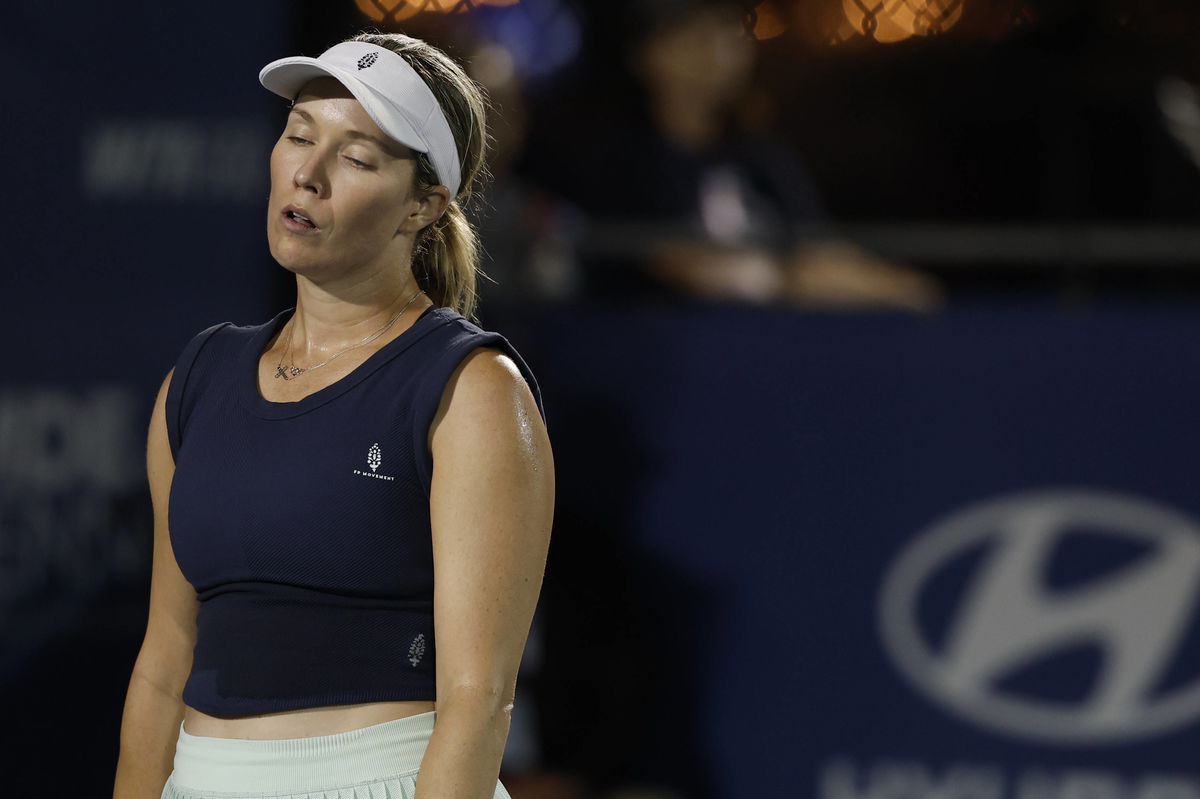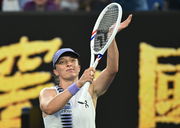
Imago
Tennis: Mubadala Citi DC Open Jul 21, 2025 Washington, D.C., USA Danielle Collins USA reacts after missing a shot against Magda Linette POLnot pictured in a women s singles match on day one of the Mubadala Citi DC Open at Rock Creek Park Tennis Center. Washington Rock Creek Park Tennis Center D.C. USA, EDITORIAL USE ONLY PUBLICATIONxINxGERxSUIxAUTxONLY Copyright: xGeoffxBurkex 20250721_gkb_sb4_094

Imago
Tennis: Mubadala Citi DC Open Jul 21, 2025 Washington, D.C., USA Danielle Collins USA reacts after missing a shot against Magda Linette POLnot pictured in a women s singles match on day one of the Mubadala Citi DC Open at Rock Creek Park Tennis Center. Washington Rock Creek Park Tennis Center D.C. USA, EDITORIAL USE ONLY PUBLICATIONxINxGERxSUIxAUTxONLY Copyright: xGeoffxBurkex 20250721_gkb_sb4_094
Earlier this year at the Australian Open, Danielle Collins walked into a storm of boos during her second-round match against local wildcard Destanee Aiava. The crowd didn’t hold back, and neither did Collins. At one point, she cupped her hand to her ear, motioned to her backside, and even took the microphone after match point to address the fans. “Thanks for the boos,” she fired back. “You all pay my bills.” A few months later in Strasbourg, the pattern repeated.
Watch What’s Trending Now!
This time, the flashpoint came from behind the lens. In the middle of a tight match against Emma Raducanu, Collins stopped play to call out a cameraman who she said was crowding her and Raducanu during changeovers. “It’s wildly inappropriate,” she snapped. “You don’t need to be on top of Emma like that.” While some framed the moment as another outburst, Collins saw it differently: as an assertion of boundaries.
This time, when Collins arrived at the Mubadala Citi DC Open this week, the stakes weren’t just about performance. She was fighting to get her season back on track, yes—but also to reclaim control of her own story. Her match against Poland’s Magda Linette was intense from the start. Rallies stretched long. Points were fiercely contested. Collins, still chasing rhythm this season, looked determined to wrestle this one her way. But from early on, the atmosphere in the crowd began to shift. A man’s voice pierced through between points, repeatedly shouting “Come on, Danielle!”—a heckle laced with sarcasm that eventually drew an umpire warning. Then, during a changeover, that same voice crossed a line.
ADVERTISEMENT
“I knew you were a racist when I saw you on TV.” Collins’ rhythmic bouncing ceased. You could see her shoulders stiffen. She blinked twice, as if shocked, then looked into the stands but didn’t respond. Several seconds of stunned silence hung in the air. The umpire sprang into action, gesturing firmly and announcing, “Security, please.” The camera lens caught three security staffers briskly crossing the court. One placed a steady hand on the heckler’s arm, guiding him up the steps. The man kept smiling, seemingly trying to make eye contact with other fans as they escorted him out.
As the man reached the exit, the crowd erupted into applause—a reflexive, unifying response to a crossing of the line. That’s when Collins—after a moment’s pause—leaned forward, closed her eyes, took a deep breath, and walked back to the baseline to resume play. But even with the crowd’s support, her game seemed frayed; Linette seized control, closing out the match 7–5, 6–4.
Oh🤭 pic.twitter.com/EDmumUUGYu
— Gosia (@Gosia_CzBradf) July 22, 2025
ADVERTISEMENT
It wasn’t the first time Collins had found herself in an unsettling position off the court. Just days later, her words from a podcast appearance would add chilling context to the moment, revealing that what played out in Abu Dhabi
ADVERTISEMENT
Danielle Collins reveals shocking incident with a cameraman
On July 16, Collins opened up in a candid chat on the ‘Reign’ podcast, taking aim at the double standards women face in the sport. She put it plainly: “When we respond to someone’s poor behavior, it’s our reaction that’s treated like the offense itself. It’s almost like you don’t have a right to respond. People just… they don’t get it. They don’t get what we go through.” Collins pulled no punches, calling out the unacceptable behavior from some men that often gets swept under the rug.
Top Stories
John McEnroe Breaks Silence on the Potential of Coaching Carlos Alcaraz After Australian Open

Iga Swiatek at the Center of a Possible WTA Shake-Up After 4-Time Slam Winner Speaks Out

Ukrainian Tennis Media Calls Out WTA’s Silence on Player Support

Australian Open Star Who Defeated Jannik Sinner to Win $1M Gets His Tennis’ Biggest Call

Emma Raducanu’s Coaching Turmoil Sparks Sharp Questions From Tennis Legend: “Who’s Making Those Decisions?

She didn’t stop there. Collins shared a jaw-dropping memory from her early days on tour—a run-in with a persistent cameraman that still stings years later. “I lost the long three-set match, came off the court, and was kind of cramping and tired and all of these things were happening. This guy goes, ‘Oh Danielle, you know, I’m so sorry. Can I give you a hug?’ I look at my coach and I’m like, ‘Uh, sure.’ He goes in to hug me and all of a sudden he goes in to kiss me! And I’m like, ‘Oh no!’ He literally starts making out with the side of my face.” Moments like this are the reminders of the real challenges behind the spotlight.
Collins, who burst onto the major stage as a 20-year-old wildcard at the 2014 US Open, has seen plenty of tennis drama over the last decade. The exact timing of that cameraman incident isn’t clear, but what’s certain is her resilience. She even took a step back last year, announced and then postponed her retirement plans to focus on starting a family, and fought her way back to the tour after overcoming endometriosis—a true testament to her grit.
ADVERTISEMENT
This season hasn’t exactly gone her way, with early exits and struggles to find peak form nagging at her heels. But if we’ve learned anything, it’s this: Danielle Collins is a fighter. Can she use this latest challenge as fuel and make another bold comeback? Let us know your thoughts in the comments below!
ADVERTISEMENT
ADVERTISEMENT
ADVERTISEMENT
